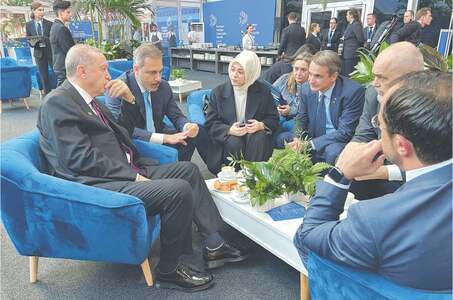LONDON: SriLankan Airways is putting on extra flights to meet the rush home by thousands of exiles in the wake of a ceasefire in the island’s long-running civil war and new hopes of a permanent peace settlement.
Flights from Britain - home to at least 175,000 Sri Lankans - have been fully booked for the last two months.
“Our daily flights to Colombo are full and now we hope to add two more flights a week to meet the additional passenger load,” says a happy Sivaswamy Ramachandran, the national carrier’s UK country manager.
Travel agents say that most of the passengers are Tamils, who make up about 11 per cent of Sri Lanka’s 19 million people. The community’s claims of discrimination by the majority Sinhalese people fuelled demands for more autonomy and subsequently for independence.
“You won’t believe what it meant to return home after all these years,” says Rajesh Jayabalan, who left Sri Lanka 18 years ago because he did not want to be caught up in the intensifying civil war.
Neither he nor his wife, Subodhini, had been back to the island until they decided last month to take advantage of the Norwegian-sponsored truce.
“Food and consumer items are now available in the north,” he says after his two-week holiday. “The people look much happier and they are able to move about freely. That is what they want most.”
Subodhini enthuses about the seafood that she says was freely and cheaply available in the troubled Jaffna peninsula, cultural heartland of the Tamils, where they once lived.
“If I can go back home tomorrow, I will do so,” she says, though the family is doing well in Britain.
Peace talks have been started in the past, but have always collapsed. What has changed this time is the international situation - particularly the Sept 11 attacks on the United States.
Washington moved not only against the suspected Al Qaeda group but terrorist organizations in general. The main secessionist group in Sri Lanka, the Liberation Tigers of Tamil Eelam (LTTE) feared that it might become a US target.
Political developments in Sri Lanka added to the possibilities for change.
The December 2001 parliamentary elections saw the defeat of President Kumaratunga’s People’s Alliance and a narrow victory for the United National Front (UNF) - an alliance between the United National Party and dissidents from the Kumaratunga camp.
UNF, led by Ranil Wickremesinghe, went to the polls on a peace platform, and won. But he had to live with Kumaratunga, who was critical of his peace talk and who continues in office as president until 2005. Such an antagonistic relationship posed potential problems, especially since Kumaratunga is commander-in- chief of the armed forces and is constitutionally the head of the Cabinet.
But although she blew hot and cold on the peace issue and even tried to whip up the ultra-Sinhala Janata Vimukti Peramuna (JVP, People’s Liberation Front) into opposing talks with the LTTE, the international community welcomed the peace moves.
Most of all, India which originally funded, armed and trained all the Tamil militant groups, including the LTTE, and eventually burnt its fingers when the Tigers turned against New Delhi, also gave its blessings to the peace drive.
Following a Memorandum of Understanding between Wickremesinghe and LTTE leader Velupillai Prabhakaran, initial talks are to be held in Bangkok in May. With the LTTE dropping their demand for a separate state, the government is hopeful that the current ceasefire can be turned into a permanent peace.
Washington has put pressure on the Tigers by warning them not to violate the ceasefire.
While many Tamils living in Britain and other countries of exile are keen to go home if peace comes, not all have faith in LTTE promises.
Some former members of other militant groups whose leaders were killed by the Tigers say that the LTTE’s abandonment of the idea of Tamil Eelam may be temporary.
“I know the LTTE. I was a member till I escaped and came to London. Once they get a foothold in the administration in the north-east in any new constitutional arrangement, they will soon be preparing for their eelam (separate state),” warns ex-fighter Ravi, using his former nom de guerre.—Dawn/Gemini News Service.













































Dear visitor, the comments section is undergoing an overhaul and will return soon.